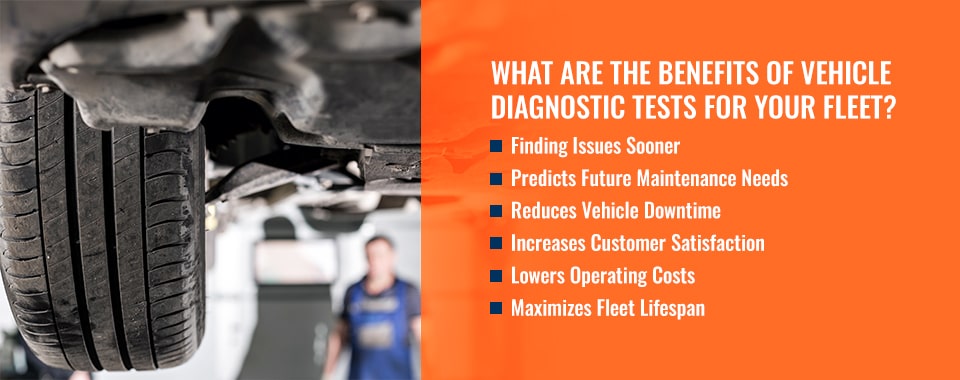

With the amount of time your trucks spend on the road, you never know when a mechanical issue will occur. If you’re a transportation company operator, fleet manager or owner of any business that relies on trucks, fleet maintenance isn’t something you can take for granted. Following a regular preventive maintenance schedule ensures your technicians can detect and correct minor problems before they become expensive repairs that put a truck out of commission for a long time.
As truck engines and other components become more technically complex, it’s also more challenging to determine the cause of a mechanical issue. These days, sophisticated computer systems control most truck functions. Diagnostic testing, which entails a detailed digital analysis of these systems, has become an essential element of any reliable fleet management and preventive maintenance program.

Because truck diagnostic testing gives you more insight into the vehicle’s overall performance and condition, the process can provide numerous benefits for fleet owners and managers.
Some mechanical problems start small, like a tiny, undiscovered roof leak. It might not cause much damage at first, but eventually, it can lead to an entire roof replacement. Detecting and fixing these minor issues early on prevents a more expensive project down the road.
Likewise, a problem like a loose radiator hose may go unnoticed for many miles. However, it can ultimately lead the engine to overheat and leave a driver stranded.
Timely diagnostic testing can reduce or eliminate these headaches and minimize unproductive downtime.
The data generated by a diagnostic test enables technicians to pinpoint signs of wear and other malfunctions that can help predict failure points in the future. Intuitive fleet management software makes it possible to track and monitor these issues and plan a more aggressive maintenance schedule if needed.
An analogy would be when your doctor determines that you have slightly high blood pressure. While your condition might not be a cause for immediate concern, a health provider may want to schedule more frequent checkups to ensure your blood pressure remains under control.
There’s an adage in the trucking industry — “If the wheels don’t turn, you don’t earn.” When you consider that the cost of vehicle downtime can range from $448 to $760 per day, it’s easy to see a truck that’s off the road for even a short time can create a substantial revenue loss.
Vehicle diagnostic tests can prevent problems that mechanics can often correct on the spot before the truck returns to service. It’s much less costly for a company to be without a truck for an extra hour or two instead of several days or weeks.
What happens when a truck breaks down in the middle of a route? Besides the extra repair costs and hassles, it also means your customer won’t receive their delivery on time. Even one late shipment can be enough for a valued customer to take their business elsewhere.
If you take a more proactive approach to maintenance, including conducting scheduled diagnostic tests, you’re less likely to experience interrupted routes and late deliveries. You’ll enhance your customer retention efforts and gain an edge in today’s highly competitive business climate.
How much is your company spending on fleet repairs each year? It’s no mystery that more involved repair jobs are more costly to transportation companies and small businesses than minor adjustments or routine maintenance.
By using vehicle diagnostics to maintain your fleet, you’ll reduce your overall repair costs, which can lead to substantial long-term savings for your company. While purchasing the diagnostic equipment and software requires an upfront investment in technology, you’ll realize a significant return on investment in the form of lower repair bills, fewer fleet management expenses and a healthier bottom line.
A brand-new truck can cost anywhere from $130,000 to $200,000, a significant expense for any organization. Timely preventive maintenance with the help of comprehensive diagnostic testing can lengthen the time between vehicle replacements. By uncovering and correcting mechanical issues early, you can reduce wear and tear that ultimately shortens a truck’s lifespan. And if you decide to trade or sell a vehicle at some point, you’ll get a higher resale value if it’s in better condition.
You can invest the money you save by not replacing trucks as frequently into other areas of your business operations — like hiring qualified drivers.
Here are examples of the fleet diagnostics you should be using.
Several factors determine the appropriate frequency of conducting vehicle diagnostic tests for your fleet. If your trucks accumulate miles quickly or operate in challenging road conditions, you could need to check them more often. Also, your state might have specific guidelines regarding emissions inspections, which may require annual or semi-annual testing.
Fleet managers should work closely with their maintenance teams to determine which tests are suitable for their vehicles and the timeline for conducting them. It’s also crucial to maintain the schedule to prevent unexpected mechanical failures.
A truck tracking system from Track Your Truck removes the burden of remembering to perform these diagnostic tests. You can set up alerts so you’ll know when it’s time to perform specific tests and other preventive maintenance tasks for every vehicle in your fleet. You’ll never have to worry about missing tests that could impact your fleet’s performance and lead to costly downtime.
For those that have more complex maintenance needs, the system can integrate with a number of partners.
Contact us to learn more about the benefits of vehicle diagnostic tests for your fleet and request a no-obligation software quote.